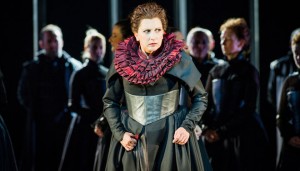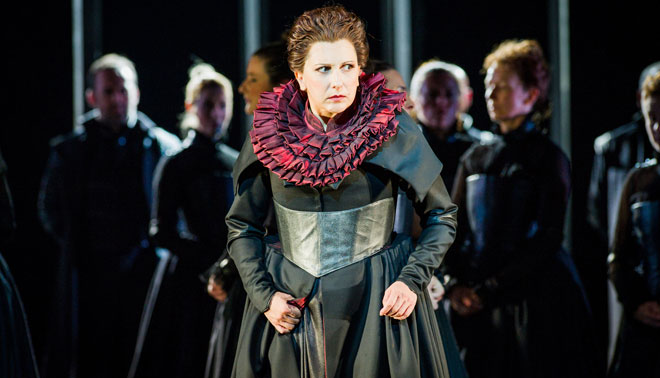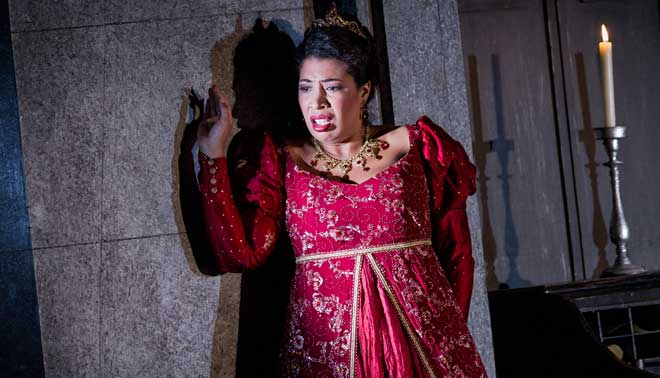Welsh National Opera are at the Birmingham Hippodrome this week with a programme that veers from the popular to the esoteric. Nothing wrong with that and WNO must be congratulated for its current programme presenting three of Donizetti’s four Tudor opera’s. It would be fair to say that the operas in question are not terribly well known, one might even say obscure. To tour them around the provinces to audiences largely starved of quality opera is a very brave step indeed. But if any company can raise awareness and popularise them, WNO certainly can. I saw their season in Birmingham earlier in the year which persuaded me they are one of the finest opera companies in the country. Their Lohengrin was breathtaking.
Perhaps to balance the less known works, their current season opened with one of the most popular operas, Tosca. Snooty opera buffs often turn their noses up at Puccini – too melodic, too shallow and, the worst possible sin, too popular. Their loss.
I love Puccini and no matter where I veer, however much I get engrossed in Wagner or the more obscure works of Donizetti, dear old Giacomo is always there like a favourite uncle. And of all his works Tosca must be the greatest and there have been some great productions. The greatest Cavaradossi, in my lifetime anyway, must be Placido Domingo and the two performances I remember were at Covent Garden in the late 80s and the real-time, actual locations, live production of Tosca on television in July 1992. I’ve seen some pretty bad ones too. So, where does Welsh National Opera’s production slot in?
Firstly, it must be said that this is an old, traditional production dating from 1992. That is not a criticism but it is certainly very different from the other operas currently playing in the Birmingham season. Nonetheless Tosca is visually very attractive. I particularly liked the lighting in act one with the daylight pouring through the church door.
Performancewise the evening was dominated by Mary Elizabeth Williams in the title role. Her singing was powerful and outstanding and she also looked good and was totally convincing as the distraught diva. I had not heard of or seen Ms Williams before but I shall certainly be looking out for her in future. Claudio Otelli was a smooth but cruel operator as Scarpia and Willian Robert Allenby shone as the Sacristan.
It would be unfair not to mention the orchestra who played beautifully and sensitively under the direction of Lothar Koenigs but managed to whip up a storm when necessary. It would be difficult and churlish to find fault with WNO’s Tosca which I thoroughly enjoyed.
 The trio of Donizetti operas opened with Anna Bolena. Of course, we all know Henry VIII’s second wife was Anne Boleyn but the opera is based on two forgotten Italian histories, Ippolito Pindemonte’s Enrico VIII ossia Anna Bolena and Alessandro Pepoli’s Anna Bolena. The opera was first performed in the Teatro Carcano, Milan on 26th December 1830 and established Donizetti alongside Bellini and Rossini. Anna Bolena was first performed in England at the King’s Theatre in London on 8th July 1831.
The trio of Donizetti operas opened with Anna Bolena. Of course, we all know Henry VIII’s second wife was Anne Boleyn but the opera is based on two forgotten Italian histories, Ippolito Pindemonte’s Enrico VIII ossia Anna Bolena and Alessandro Pepoli’s Anna Bolena. The opera was first performed in the Teatro Carcano, Milan on 26th December 1830 and established Donizetti alongside Bellini and Rossini. Anna Bolena was first performed in England at the King’s Theatre in London on 8th July 1831.
It’s hard to know why Anna Bolena is not performed more often. It has a strong story line, memorable characters, some really fine chorus pieces and a dozen or so really outstanding songs. This production, if there is any justice in the world, will go a long way towards putting Anna Bolena where it belongs alongside Tosca, La Traviata, Otello and all the other great tragedies in opera’s dramatic canon.
Anna Bolena is one of opera’s great unsung [surely some mistake. Ed.] heroines. Her character is as strong as any and she has some wonderful songs. Linda Richardson gave a faultless performance. She looked good and her singing and acting were of a level rarely seen outside the great opera houses of the world. Her performance in the final scene was truly breathtaking on all levels. Her duet Sul suo capo aggravi un Dio with Katherine Goeldner as Jane Seymour (who as we all know, later became Henry VIII’s third wife) was superb and is arguably Donizetti at his peak.
While Mesdames Richardson and Goeldner were superb, I must say that I was particularly taken by Robert McPherson who played Anna’s erstwhile lover, Lord Percy. He had a voice so sweet and clear I could have listened to him all night and I was enthralled by every sound he uttered. It is rare to hear a voice of such clarity and beauty. I loved him.
I am a great fan of WNO and cannot rate them highly enough. This production ranked alongside their best so it pains me to have to add a word of criticism. Their current work, visually, is always stunning. The sets, lighting and costumes are as good as you will see anywhere but I’m afraid there was one aspect of Anna Bolena that really did not work – the portrayal of Henry VIII.
 I’m all for artistic license and for the innovation and originality for which WNO can be justly proud but when a work is based on historical characters I don’t think you can just ignore it, especially when one of those characters is so iconic. I am not quite so sure of the wisdom of making Henry so completely unrecognisable with not the slightest concession made to the image of which we are all aware. There was not one thing about Alastair Miles’ king that said Henry VIII. One had to keep reminding oneself who he was. For a character as visually well known as Henry, I think it poor judgement to represent him as some sort of warrior out of Mad Max. This should not be taken as a criticism of Alastair Miles whose singing and acting were beyond reproach, projecting, as he did, a real sense of the absolute power of a monarch who literally could snuff out a life on a whim. Had he been playing some fictitious character I would have had no problem. Point made, I hope.
I’m all for artistic license and for the innovation and originality for which WNO can be justly proud but when a work is based on historical characters I don’t think you can just ignore it, especially when one of those characters is so iconic. I am not quite so sure of the wisdom of making Henry so completely unrecognisable with not the slightest concession made to the image of which we are all aware. There was not one thing about Alastair Miles’ king that said Henry VIII. One had to keep reminding oneself who he was. For a character as visually well known as Henry, I think it poor judgement to represent him as some sort of warrior out of Mad Max. This should not be taken as a criticism of Alastair Miles whose singing and acting were beyond reproach, projecting, as he did, a real sense of the absolute power of a monarch who literally could snuff out a life on a whim. Had he been playing some fictitious character I would have had no problem. Point made, I hope.
The sets and lighting were stunning and even though everyone was all in black, the austere, unfrilly costumes were beautiful too. All in black, that is, until the very end when Anna, awaiting her cruel fate, donned a flowing, blood-red taffeta gown. The last scene as she walked off to the scaffold drenched in ice-cold white light was astounding and quite extraordinary.
A special mention must be made of the chorus who looked and sang beautifully and were an integral part of the production. The orchestra under the direction of Andrew Greenwood was as good as ever and if it hadn’t been for my concerns about the way Henry VIII was portrayed the whole evening would have been near perfect. – Michael Hasted



